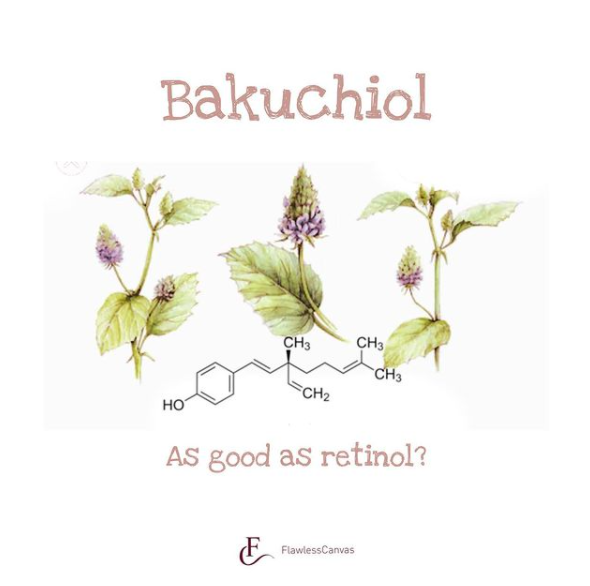BAKUCHIOL also known as (1E,3S)-3-ethenyl-3,7-dimethyl-1,6-octadien-1-yl]phenol) is a meroterpene phenol derived from Psoralea corylifolia. Bakuchiol is not a retinoid (vitamin A derivative), but due to some similar gene expression patterns (similar not identical), bakuchiol has been wrongly named the “plant derived (or vegan) retinol”. There is no evidence that bakuchiol interacts with retinoic acid receptors, which are responsible for the anti-aging benefits of vitamin A.
The “plant derived retinol” story is based on in vitro data showing overlapping (not identical) gene expression between bakuchiol and retinol. In addition, bakuchiol also showed to increase some retinoid binding and metabolizing genes, although no functional link has been demonstrated. In vitro data (in the lab) showed that bakuchiol has anti-inflammatory, antibacterial and antioxidant properties and that it is a good collagen I, III and IV inducer. Bakuchiol is a phytoestrogen, a plant derived molecule that mimics estrogen benefits. Phytoestrogens are well known for their anti-aging benefits such as increasing keratinocyte proliferation, epidermal thickness, epidermal hydration, and skin elasticity. They also reduce skin wrinkles, increase collagen content and quality and vascularization.
In a clinical study (12 weeks) 0.5% bakuchiol showed “similar effects” to 0.5% retinol with “less irritation”. There are a couple of caveats to this “equal efficacy with less irritation” conclusions. First, bakuchiol was applied twice daily while the retinol preparation was only applied at night only. There is no indication that a moisturizer was used in these protocols which explain the scaling (lack of tolerability) observed in the retinol group at week 4, 8 and 12. In real life, a 0.5% retinol product will be always paired with a moisturizer to prevent dryness, scaling and redness. At week 4 bakuchiol induced significantly higher redness than retinol while at week 8 and 12 these two groups showed similar results. Finally, retinol performed better at improving fine wrinkles and pigmentation at all the time points. The lack of statistical significance could be due to the small groups of subjects used in this study (proximally 20 per group).
FINAL THOUGHTS: I think bakuchiol is a great molecule that can provide anti-aging benefits and may be an alternative for people with super sensitive skin that cannot tolerate retinoids. It needs to be added to formulation at a minimum of 0.5% to see results (max. recommended in 1%). In the past, I did design a product containing this ingredient as one of the key components to control acne and inflammation. Would I replace my retinol by bakuchiol? NO! Would I add it on the top of my 0.5% retinol? NO! There are no studies that show synergistic effects between retinol and bakuchiol and therefore there is no need to add it on the top of an efficacious form of vitamin A.
#skincarejunkie #theskinbiologist #skincare #skincareproducts #antiaging #antiagingskinc

